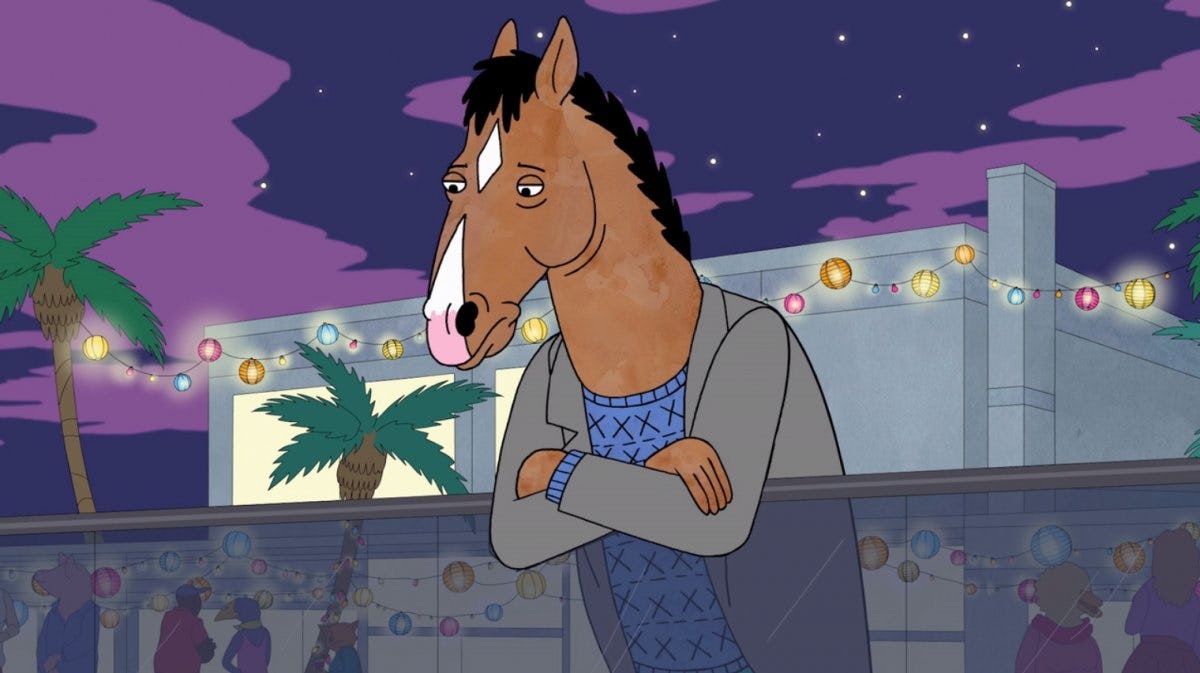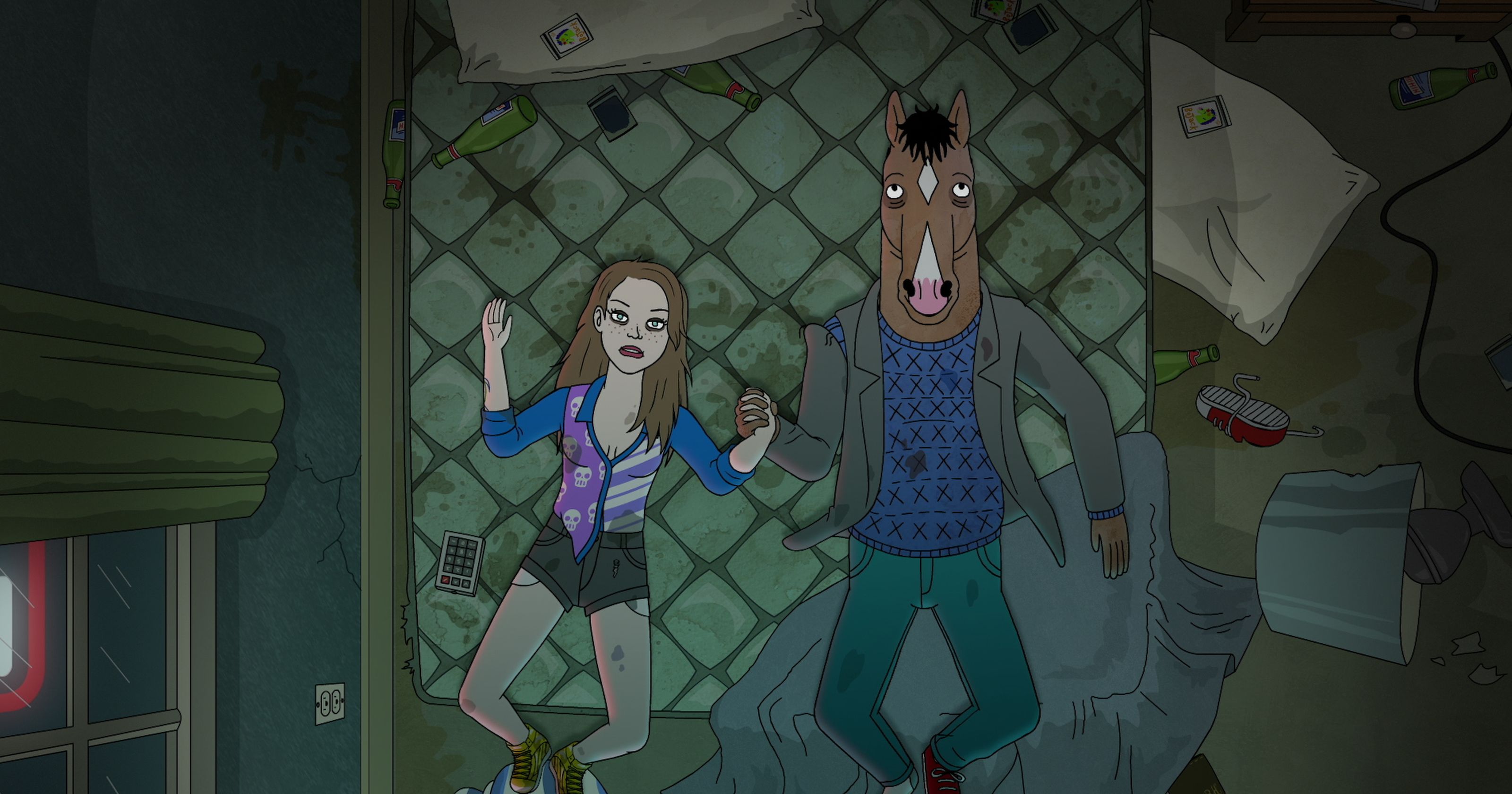
Whenever a TV show, movie, or other piece of media tries to do a realistic take on a serious issue, I tend to roll my eyes and brace myself. That’s because nine times out of ten, the writers and producers of these rarely sincere efforts get things half-assed or ass backwards. Sometimes, they’re not just wrong in their portrayal of an issue. It’s downright destructive. See the first season of “13 Reasons Why” for disturbing proof.
That makes any show that succeeds in portraying a serious issue all the more powerful. By that standard, “Bojack Horseman” is a diamond within a golden crown atop a pile of steaming cow shit. I apologize for the visual, but I feel like that’s the best way to get my point across.
I’ve found plenty of reasons to praise this show since it ended, but being stuck at home for weeks on end has given me more time to appreciate the many amazing things this show achieved. It’s hard enough to get emotionally worked up over a show about real people. To get worked up about a show of cartoon human/animal hybrids counts as a special achievement.
It’s not secret that “Bojack Horseman“ tackles a lot of sensitive issues with varying degrees of sincerity, humor, and tact. The show always tries to entertain, but it also makes a concerted effort to approach these issues in a way that doesn’t feel shallow or half-hearted. Again, see “13 Reasons Why” for an example of how poorly this can go.
I’ve already highlighted how this show gives a well-developed take on the nature of addiction, an issue that is rarely more than plot catalyst for zany antics in most shows. There’s another issue that “Bojack Horseman” handles with just as much skill and it’s one that shows almost always get wrong when they try to tackle it. That issue is depression.
I’m not talking about the kind of depression we feel when a loved one dies, a spouse divorces us, or the show that made us a famous actor in the 1990s gets cancelled. I’m referring to real clinical depression, which is a real medical issue that plagues a lot of people in the real world, including people I know personally.
Now, I understand why depression is so difficult to confront in a half-hour/hour-long TV show. It’s not like the flu or some visible wound that you can treat directly and watch heal. Depression, at its core, is a one-two punch of chemical and mental that complement one another perfectly to make someone miserable to a crippling degree.
It’s chemical in that there are parts of the brain that just aren’t operating properly. The systems that usually make someone happy and content just aren’t working right. They often require medication or extensive cognitive therapy to get that system going again.
The mental part plays off those deficiencies in that they foster this mindset that keeps people in a constant state of doom, gloom, and misery. That mindset often acts as a catalyst for various destructive behaviors, from substance abuse to violent outbursts to self-harm. The effects vary wildly from person to person, but the mentality remains the same.
Where TV shows and movies often fail with depression is two-fold. First, it fails to depict the extent of someone’s depression. Second, it fails to show how it’s properly treated. Just showing someone in a saddened state isn’t the same as showing someone who’s clinically depressed. It only gets worse when that same show or movie tries to treat it as though it has a singular cause.
Sometimes, it’s because a character was abused.
Sometimes, it’s because a character lost a loved one.
Sometimes, it’s because a character didn’t make one single choice that haunts them.
Those are all decent catalysts for character development, but that’s not how depression works. It doesn’t just come from one action or inaction, nor can it be treated by confronting it. You can’t just go on a quest, save the day, and suddenly be a glowing ball of happiness. Depression is more complex than that.
That’s why it was so refreshing to “Bojack Horseman” take a very different approach. Throughout the show, Bojack is shown to have many issues. Depression is just one of them. He’s a substance abuser, a narcissist, and insanely self-destructive. If he went to a therapist, they’d need overtime to treat all his issues.
However, most therapists would agree that Bojack meets the criteria for clinical depression. He’s in a constant state of misery throughout the show and goes to great lengths to alleviate that misery, but often ends up making himself more miserable due to bad behavior and terrible judgement. In essence, his other personal issues often compound his depression.
Unlike other shows, though, the source of his depression is never framed as one particular thing. While he is shown to have abusive parents, substance abuse problems, and crippling guilt from his many bad decisions, there’s never a point where one issue becomes the source.
That, in and of itself, is an important distinction in portraying depression in a realistic way. However, of all the moments that highlight the extent of Bojack’s depression, one episode stands out over all the others. That episode is aptly called “Stupid Piece of Sh*t.”
In this episode, Bojack is trying to deal with his previously estranged daughter (who turns out to be his half-sister) and his abusive mother, who is declining mentally in her old age. Like the many other challenges he faces throughout the show, his depression makes this difficult. What makes this episode stand out, though, is how it’s rendered through Bojack’s thoughts.
Through the colorful animation and the haunting voice talent of Will Arnett, these internal monologues give a voice to a depressed mentality the likes of which few shows have captured. It still utilizes a semi-humorous tone, but never stops being real or serious. It’s a powerful insight into what Bojack goes through every day. It doesn’t excuse his awful behavior, but it does provide an important context.
What makes this portrayal all the more powerful is when Hollyhock, his half-sister, asks him about it later in the episode. Like Bojack, she appears to be struggling with that same inner monologue and it’s not a pleasant feeling. She’s young hasn’t lived long enough to make Bojack’s mistakes, which makes her question at the end downright heartbreaking.
That voice in the back of my head that tells me I’m dumb and stupid that’s just stupid, it goes away it’s just a teenage girl thing right. Those voices… they go away, right?
That question, and the way Bojack answers it, cements this episode and this show as one of the best portrayals of real depression in any medium. At a time when we’re all isolated, I think it’s important to understand what real depression looks like. Even if it comes from a show about talking horsemen who sound like Will Arnett, it’s an important perspective that we can all appreciate.


/cdn.vox-cdn.com/uploads/chorus_image/image/61408593/BoJackS5_EP6.0.png)






